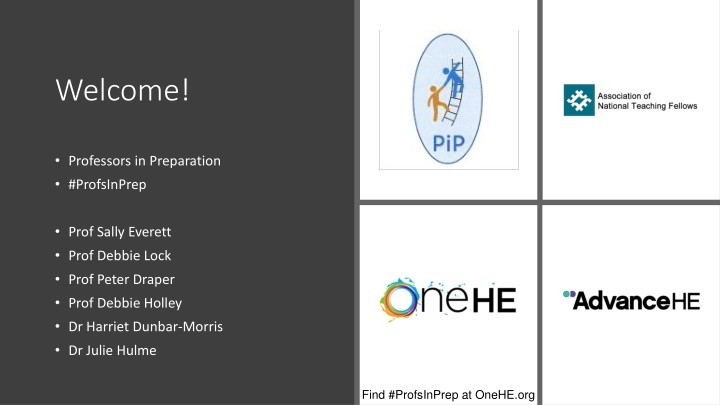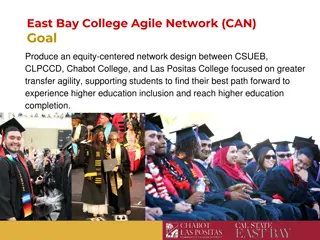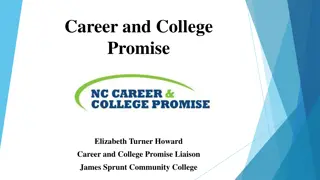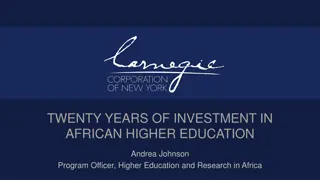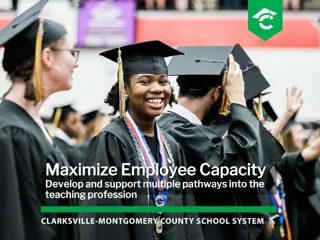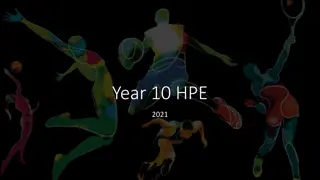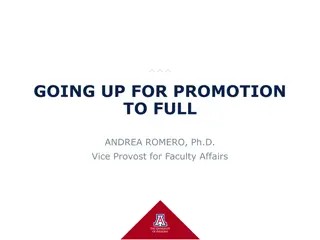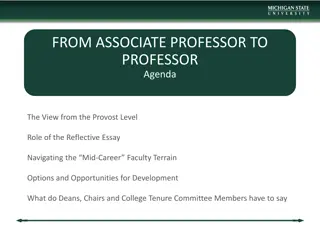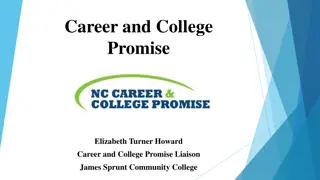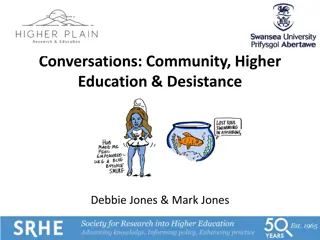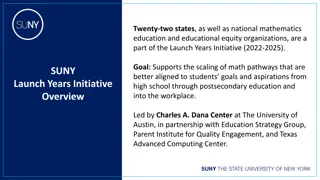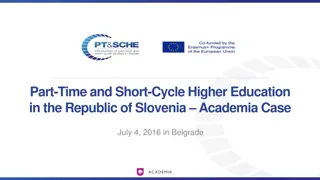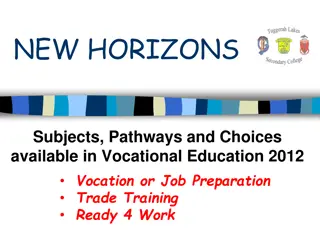Enhancing Pathways to Professorship in Higher Education
Professors in Preparation (#ProfsInPrep) aims to address the need for more teaching-focused staff in senior positions to mentor and support junior faculty members, helping them develop their teaching careers. The initiative focuses on building a supportive network, facilitating reflection and professional development, conducting research on promotions criteria, and organizing events to share expertise and support. Today's session explores accumulating evidence of impact, navigating university criteria, overcoming imposter syndrome, and utilizing peer support within the PiP network to progress towards a professorship.
Download Presentation

Please find below an Image/Link to download the presentation.
The content on the website is provided AS IS for your information and personal use only. It may not be sold, licensed, or shared on other websites without obtaining consent from the author.If you encounter any issues during the download, it is possible that the publisher has removed the file from their server.
You are allowed to download the files provided on this website for personal or commercial use, subject to the condition that they are used lawfully. All files are the property of their respective owners.
The content on the website is provided AS IS for your information and personal use only. It may not be sold, licensed, or shared on other websites without obtaining consent from the author.
E N D
Presentation Transcript
Welcome! Professors in Preparation #ProfsInPrep Prof Sally Everett Prof Debbie Lock Prof Peter Draper Prof Debbie Holley Dr Harriet Dunbar-Morris Dr Julie Hulme Find #ProfsInPrep at OneHE.org
Why #ProfsInPrep? There are relatively few teaching-focussed staff in more senior positions who can review, mentor and support teaching staff; act as role models for junior staff who are seeking to develop a teaching/education career (Fung and Gordon, 2016); help individuals to collate a mix of quantitative and qualitative evidence that provides a clear sense of their teaching achievements (McHanwell & Robson, 2018)
Aims of #ProfsInPrep To provide a supportive network of colleagues peers and profs To facilitate reflection on our own development, progression and aspirations, and help us to reach our goals Research on promotions criteria, processes and policy To create a pipeline community Events around the country sharing experience, expertise and support for aspiring profs
Todays aims How to accumulate, articulate and present evidence of institutional and wider impact in the teaching and learning domain (for example, through publications, conference presentations, OERs and disciplinary and other networks; How to work with diverse university criteria through their teaching and learning routes and present a good case accordingly; How to overcome imposter syndrome and build confidence about applying for senior university appointments How to use the professors in preparation (PiP) network to gain peer support and mentoring.
Getting to know each other What will you profess in? Spend two minutes thinking about your professional journey so far, and how you can best present yourself as an aspiring professor Share with the people on your table
Professors in Actuality! Prof Sally Everett Prof Peter Draper Prof Debbie Holley
Reflect A recurring theme from our workshops has been the need to identify your own narrative What is in your shop window? How did you find the getting to know each other activity? Reflect on how clearly you can articulate your identity and your achievements What does this tell you about your narrative?
Collecting evidence Another key theme from our workshops so far has been around the challenges in collecting evidence and what is appropriate evidence? Some clear messages already identified in looking at existing promotions criteria:
Common themes Reach (institutional, national, international, discipline?) Impact what difference did it make? (income, resources, student experience, influence others practices, influence practitioner education, pedagogic research, policy, others?) Leadership (mentoring, programmes, management, professional bodies?) Citizenship (local communities, equality, professional practices?)
World caf Each of the four themes are hosted on the tables One person stays at the table notes and facilitation, report back Others say what you want to say, hear what you want to hear, move around and vote with your feet!
Plenary Where do we need support? Can we help each other? Importance of networks join us on the OneHE platform! Role of mentors peer and professorial
